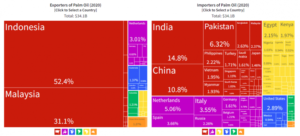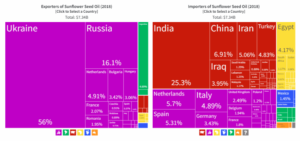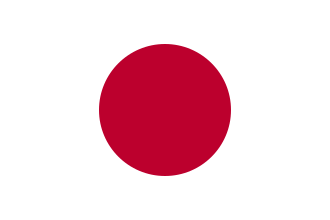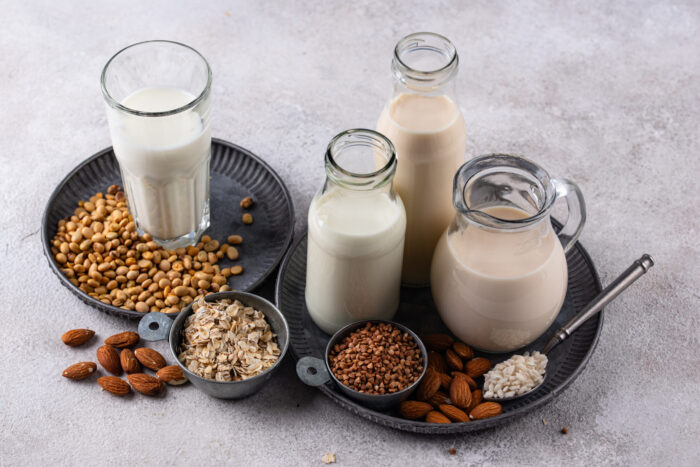
The Implications of Palm Oil: Exploring What’s Practical, Ethical, and Kosher.
Food industry professionals aren’t the only ones talking about one of the world’s most common food commodities: palm oil. It seems everyone from economists to the eco-conscious have taken up the hot topic. And it’s all tied into the perspective of kosher certification in one way or another.
So what’s the problem with palm oil?
Palm oil is a huge piece of the supply chain in the food industry. By some estimations, it’s in as much as half of manufactured food products, globally. That’s because palm oil is an incredibly available, versatile and ultra-profitable plant-based fat suitable for many uses. Further, as a plant-based, edible oil that can withstand high heat, it’s a useful cooking fat in kosher Pareve applications.
Perhaps Not So Rosy
But the commodity’s plusses come along with some serious drawbacks too. In addition to known environmental concerns, experts are dissecting palm oil’s effect on economies from East Asia to Ukraine and Russia. And tightly interwoven with the economic discussion around palm oil is the ethical one, which is nothing new. Most recently, however, are questions around palm oil’s role in food economics and the supply chain. Note: OK Kosher certifies several palm oils and many products containing it. We’ll continue to monitor the global landscape affecting markets for products we certify.
As far as palm oil specifically, read on to learn more.
OK Kosher certifies several palm oils and many products containing it. We’ll continue to monitor the global landscape affecting markets for products we certify.
The palm oil discussion is intricate, so we’ll talk about some of the points experts are talking about. We’ll also touch upon the kosher status of palm oil. But first:
What is Palm Oil, Exactly?
Elaeis guineensis is the species of palm tree most often cultivated. It yields a small fruit whose red flesh and inner kernel produce their own distinct pulp and oils. Both palm oil and its industry cousin palm kernel oil are made similarly to the way other vegetable oils are made. In short, it involves the conventional steps of crushing, chemical extraction with hexane, refining, bleaching and deodorizing. To make the lesser-processed varieties, often advertised as virgin red palm fruit oil (or just red palm oil), manufacturers cold-press the flesh of the same fruit. This excludes bleaching, so the oil retains its natural color. And because the cold pressed oil gets minimally processed, it doesn’t require deodorizing. This latter type is touted for its health properties. These include greater levels of palmitic and oleic acids, as well as high carotene and vitamin E content.
Archeologists have traced palm oil’s use back thousands of years to ancient Egypt. Better known, however, is the commodity’s more recent history beginning in the early 1800’s. The palm oil trade exploded during Europe’s industrial revolution. At that time, it was used as a lubricant for trains and factory machinery. Later, the refined product became a popular industry staple for soapmaking and canning. Today, it’s used as a food commodity, biofuel, feed stock and in personal cosmetic products.
Is Palm Oil Kosher?
Strictly speaking, the kosher status (kashrus or kashrut) of a product has to do with a roster of specifications. Those concern the item’s origins, manufacturing, handling and preparation. From this perspective, there are only a few considerations we need to make in certifying palm oil as kosher.
Kosher by Origin
Firstly, origin. We always verify that the product in question is actually what it claims to be. If a company were to peddle refined animal fat as palm oil, for instance, that would certainly disqualify the product. How, then, do we make certain that we’re dealing with the product we think we are? This is at the core of all kosher certification programs. Being that each manufacturing process is unique, the kosher verification process we use will vary accordingly. OK Kosher has developed a variety of regulatory measures for this that have stood the test of time.
Kosher in Manufacturing
The manufacturing process, as mentioned above, has several steps to it. Our Rabbinic Coordinators’ and kosher field reps’ jobs are to witness and document all the steps in the process. Factors such as shared or refurbished equipment and operating temperatures influence the controls we need to put into place.
Kosher Handling
Handling and transport also present some potential issues for kosher as well. When a bulk vessel used to ship the oil is shared between different products, such as animal fats and palm oil, we’ll order specific cleaning and kosherizing procedures at a kosher wash station. We may also employ third-party verification of the last few loads carried in a given vessel. Sometimes, this aspect of kosher supervision can be even more complex than the manufacturing itself.
Kosher Preparation
Preparation has to do with the end user. We don’t certify or place restrictions on the way a consumer uses palm oil (or any other product we certify). By contrast, food service establishments we certify require strict measures for separating dairy and meat/poultry items from each other. Palm oil is plant-based, and therefore Pareve (neutral from a kosher perspective). Because of this, the above restrictions won’t apply to it as long as the oil is acceptably kosher-certified.
Additionally, palm oil is eligible for kosher-for-Passover certification. That’s because palm is not a chometz-producing grain, nor does it fall under the kosher category of kitniyos/t. Grains are largely either forbidden for use in the Passover tradition, except for use in making matzah. Kitniyos refers to certain foods like seeds and legumes that some communities customarily refrain from for Passover. (If you missed our post about coffee on Passover, catch it here.)
All these considerations form the basis of any good kosher certification. Therefore, as long as your palm oil is certified by a reliable and well-recognized kosher certifier, it’s kosher.
So Then, Why is Palm Oil So Controversial?
If we’re strictly speaking about what technically makes a product kosher for consumption, we can stop here. But that leaves many questions unanswered about this controversial commodity. In reality, the palm oil industry’s ethical implications are steeped in a history of colonialism and indigenous exploitation. That history involves the inextricably linked environmental and humanitarian concerns. In addition, the repercussions of relying so heavily on palm oil reverberate from the realm of animal welfare to the fight against carbon emissions.
Although these aren’t our usual focus points, we don’t want to completely ignore the discussion either. Let’s look at some problems people are talking about regarding palm oil, and how it may relate to kosher certification.
Is it Good or Bad for the Environment?
Perhaps central to the overall concern over palm oil is its environmental impact. It’s a multi-faceted area of this discussion. So what exactly does palm farming and palm oil production mean for the environment?
Palm Oil as Biodiesel
Back in 2007 and 2009 the US and EU, respectively, adopted directives to increase the proportion of ethanol in gasoline. The notion that increasing renewable raw materials would be advantageous to the environment led to a boom in the market for biofuel and biodiesel. Palm oil is a relatively new addition to the roster of viable biodiesel options. What’s more, producing biodiesel from palm yields the edible byproduct glycerin. Plant-based glycerin is a valuable commodity in itself for its versatility of use and suitability for vegan and kosher applications. This is as opposed to animal-based glycerin which poses issues for both.
However, according to other experts, palm-based biodiesel is just as problematic for the environment as the fuel sources companies and governments are trying to move away from.
Beyond this, environmental concerns affecting land, people and animals surround the palm oil industry. It has majorly disrupted the delicate interplay amongst them all in the Southeast Asian region, specifically. And central to this issue is deforestation.
Palm Oil and Deforestation
You don’t cultivate palm oil simply by harvesting palm fruit from the wild. Just take it from these sources:
Greenpeace has stated that “Around 24 million hectares of rainforest were destroyed in Indonesia between 1990 and 2015, according to official figures from the Indonesian government. That’s an area the size of the UK. Palm oil and paper companies are the main causes….”
The European Palm Oil Alliance says “Palm oil represents a massive globally-demanded market and has, alone contributed to a whopping 5% of tropical deforestation globally, and, overall, constitutes 2.3% of the world’s deforestation.”
Further to that, an article in Bloomberg News described palm oil as “world’s most pervasive form of tropical agriculture.” Since Industrial Revolution times, the European empires who started this business found ways to leverage industrial technology to build plantations. Specifically, by burning down existing tropical forests and replacing them with neat rows of oil palms, which thrive well in the burnt terrain. What’s more, trees only offer the benefit of absorbing carbon from the atmosphere once they’re decades old. That’s why those lush, ancient rainforests are so valuable to environmental sustainability. And newly planted palms do little to offset the damage caused by making space for them.
Attempt to Lessen Palm Oil’s Negative Impact
The Roundtable on Sustainable Palm Oil (RSPO) formed in 2004, according to their website, “…in response to the urgent and pressing global call for sustainably-produced palm oil…with the objective of promoting the growth and use of sustainable oil palm products through credible global standards and engagement of stakeholders.” The organization’s mission focuses on the proliferation of their standards and the growing proportion of relevant companies participating in the certification.
However, voices in humanitarian and environmental justice have criticized RSPO for a supposed lack of enforcement. Some even doubted the authenticity of their formation.
It’s hard to ignore that possibility when, as journalist Jocelyn C. Zuckerman in her book Planet Palm: How Palm Oil Ended Up in Everything – and Endangered the World, (The New Press 2021), “…oil-palm plantations now cover an area nearly the size of New Zealand, and some form of the commodity lurks in half the products on U.S. grocery shelves.”
As non-experts, we can’t lay claim to either side of the argument. But the dialogue around this issue simply highlights its complexity.
“…oil-palm plantations now cover an area nearly the size of New Zealand, and some form of the commodity lurks in half the products on U.S. grocery shelves.”
Jocelyn C. Zuckerman in her book Planet Palm: How Palm Oil Ended Up in Everything – and Endangered the World, (The New Press 2021).
Cruelty-Free, Animal Welfare and Endangered Species
No matter what kosher certifier your company works with, there’s no doubt your rabbi would never purposely harm an orangutan. Greenpeace has stated that “Destroying forests and replacing them with palm oil plantations wipes out critical habitat for animals that have nowhere else to go. Half of the Bornean orangutan population has been wiped out in just 16 years,” and that “Globally, 193 critically endangered, threatened and vulnerable species are threatened by palm oil production.”
But authorities in Torah Law present differing opinions on what considerations we should make in the everyday purchase of products. And how much we need to make ourselves aware about their origins. (An article in Tablet Magazine on the connection between kosher observance and the implications of palm oil caught our eye. It’s well worth a read.) So there’s room to consider these ethical concerns when making individual choices. Either as a consumer or a participant in the global supply chain. We’re aware of the increasingly-held value of buying cruelty-free or vegan products among kosher consumers. So, is palm oil cruelty-free? While the future holds hope for truly cruelty-free palm oil, it’s far from a guarantee. When selecting products not identified as such, even when it is 100% kosher, we just don’t know.
Humanitarian History and Underpinnings
By the 19th century, social causes finally started calling for an end to African slavery. The same African slavery that so many of Europe’s monarchies had become accustomed to. In response, many large corporations positioned their palm oil use as a way to support indigenous African communities. It was posed as some sort of effort to bring global industry closer to helping end slavery. Unfortunately, however, this claim was but a mask on the problem. Violent ravaging of African villages and cities still went on, to access the vast land needed to build palm plantations.
Today, now-independent Indonesia and Malaysia together produce and export 85 percent of the world’s supply. Indeed, the palm oil industry has remained in-place since colonial times. Other source-regions include Latin America, West Africa, and other tropical areas where oil palms grow. According to an article in the Boston Review , “The expansion of oil palm farming is often accomplished through violent land-grabs that robs Indigenous people and peasants of their traditional territories. Palm barons are known to employ gangs and death squads to intimidate or murder journalists, trade unionists, and environmentalists.”

Complicating this topic further is the fact that palm oil’s affordability can’t be ignored. And for poverty-stricken areas, avoiding unsustainably made palm oil is something that few can afford to do.
One step that some nations, companies and individuals have taken is to dedicate a minimum percentage of their buying to locally-sourced goods. This helps them avoid contributing to the off-shore problems that are so easy not to notice when making buying choices.
We certainly can’t do this section of the topic justice on our own. Likewise, if justice is of prime importance to your company, then a deep dive into every aspect of your sourcing is prudent in building an entity worthy of its business. It’s also a decision for each company to make individually.
Palm Oil Trade Affecting Today’s Global Economy
For all companies, the bottom line is crucial. When factoring in ethical and quality considerations, you always need to strike in order to sustain business. On top of that, the global economy is undergoing changes independent of these points, affecting the industry as a whole.
Why Are Prices Rising?
Edible oil prices are always in a state for flux. Natural influences such as weather conditions and drought affect harvests in all regions where the crops grow.
However, an interdependency exists, in particular, between palm oil and sunflower oil. In recent history, Russia and Ukraine together have produced about 70 percent of the world’s sunflower oil. Russia’s present-day invasion of Ukraine has debilitated Ukraine’s ability to provide its share. The events have astronomically lifted sunflower oil’s prices as a result. Given sunflower oil’s versatility and affordability, it was also a widely used cooking oil for the poorer regions of the world. When Ukraine’s economy took the hit, a spike in the industry’s need for an alternative arose. That points directly to palm oil, despite many companies’ efforts, and even previous commitments, to avoid it.
-

Top countries exporting and importing palm oil in 2020. -

Top countries exporting and importing sunflower oil in 2020.
In fact, in response to the recent boom, Indonesia’s government placed a freeze on all palm oil exports. This was in order to slow down rates within its own country. Yet, as of May of this year, they subsequently reversed the motion. In the market’s current state, companies are looking everywhere to source edible oils such as palm.
Future of Sustainable Palm Oil: Is There Hope?
This is where things stand. But what can we expect in the future? For one thing, several organizations have formed to take the first steps in a path to reversing deforestation. Their efforts rely on a tremendous amount of collaboration between corporations, NGO’s, governments and consumers. These organizations contribute efforts that range from independently certifying palm oil to assisting companies and governments with choosing deforestation-free options.
Other than RSPO (Roundtable on Sustainable Palm Oil), some bodies working on this mission include EPOA (European Palm Oil Alliance), Tropical Forest Alliance, and Earthqualizer. Indeed, some organizations, have undergone scrutiny for a supposed lack of accountability, further obscuring possible solutions to this complex problem. With your own research, there may be hope for a way toward ideal palm oil usage in the future. It’s certainly worth a try.
What about assuring a kosher palm oil or palm oil-containing product? If your company is looking for that added level of transparency to display to your customers, we’ve got you covered.
The information presented in this blog post is based on research, general knowledge, and/or the author’s understanding of the subject matter. This blog is provided for informational purposes only and should not be relied upon by the reader or considered as professional advice. For specific guidance on any given topic, the reader should consult a qualified professional in the given field. OK KOSHER DISCLAIMS ANY LIABILITY FOR ANY LOSS OR DAMAGES RESULTING FROM RELIANCE ON THE INFORMATION PROVIDED IN THIS ARTICLE.


 EN
EN  ZH
ZH  KR
KR  BR
BR  ES
ES  IN
IN  IL
IL  JP
JP 



